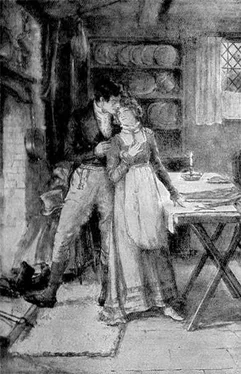"But what, then, can I bring you instead? You have no wish for fruit; yet I see that your lips are parched. What beverage do you prefer?"
"Mrs. Gill supplies me with toast–and–water. I like it best."
Silence fell for some minutes.
"Do you suffer?—have you pain?"
"Very little."
"What made you ill?"
Silence.
"I wonder what caused this fever? To what do you attribute it?"
"Miasma, perhaps—malaria. This is autumn, a season fertile in fevers."
"I hear you often visit the sick in Briarfield, and Nunnely too, with Mr. Hall. You should be on your guard; temerity is not wise."
"That reminds me, Miss Keeldar, that perhaps you had better not enter this chamber or come near this couch. I do not believe my illness is infectious. I scarcely fear"—with a sort of smile—" you will take it; but why should you run even the shadow of a risk? Leave me."
"Patience, I will go soon; but I should like to do something for you before I depart—any little service―"
"They will miss you below."
"No; the gentlemen are still at table."
"They will not linger long. Sir Philip Nunnely is no wine–bibber, and I hear him just now pass from the dining–room to the drawing–room."
"It is a servant."
"It is Sir Philip; I know his step."
"Your hearing is acute."
"It is never dull, and the sense seems sharpened at present. Sir Philip was here to tea last night. I heard you sing to him some song which he had brought you. I heard him, when he took his departure at eleven o'clock, call you out on to the pavement, to look at the evening star."
"You must be nervously sensitive."
"I heard him kiss your hand."
"Impossible!"
"No: my chamber is over the hall, the window just above the front door; the sash was a little raised, for I felt feverish. You stood ten minutes with him on the steps. I heard your discourse, every word, and I heard the salute.—Henry, give me some water."
"Let me give it him."
But he half rose to take the glass from young Sympson, and declined her attendance.
"And can I do nothing?"
"Nothing; for you cannot guarantee me a night's peaceful rest, and it is all I at present want."
"You do not sleep well?"
"Sleep has left me."
"Yet you said you were not very ill?"
"I am often sleepless when in high health."
"If I had power, I would lap you in the most placid slumber—quite deep and hushed, without a dream."
"Blank annihilation! I do not ask that."
"With dreams of all you most desire."
"Monstrous delusions! The sleep would be delirium, the waking death."
"Your wishes are not so chimerical; you are no visionary."
"Miss Keeldar, I suppose you think so; but my character is not, perhaps, quite as legible to you as a page of the last new novel might be."
"That is possible. But this sleep—I should like to woo it to your pillow, to win for you its favour. If I took a book and sat down and read some pages? I can well spare half an hour."
"Thank you, but I will not detain you."
"I would read softly."
"It would not do. I am too feverish and excitable to bear a soft, cooing, vibrating voice close at my ear. You had better leave me."
"Well, I will go."
"And no good–night?"
"Yes, sir, yes. Mr. Moore, good–night." (Exit Shirley.)
"Henry, my boy, go to bed now; it is time you had some repose."
"Sir, it would please me to watch at your bedside all night."
"Nothing less called for. I am getting better. There, go."
"Give me your blessing, sir."
"God bless you, my best pupil!"
"You never call me your dearest pupil!"
"No, nor ever shall."
* * * * *
Possibly Miss Keeldar resented her former teacher's rejection of her courtesy. It is certain she did not repeat the offer of it. Often as her light step traversed the gallery in the course of a day, it did not again pause at his door; nor did her "cooing, vibrating voice" disturb a second time the hush of the sickroom. A sickroom, indeed, it soon ceased to be; Mr. Moore's good constitution quickly triumphed over his indisposition. In a few days he shook it off, and resumed his duties as tutor.
That "auld lang syne" had still its authority both with preceptor and scholar was proved by the manner in which he sometimes promptly passed the distance she usually maintained between them, and put down her high reserve with a firm, quiet hand.
One afternoon the Sympson family were gone out to take a carriage airing. Shirley, never sorry to snatch a reprieve from their society, had remained behind, detained by business, as she said. The business—a little letter–writing—was soon dispatched after the yard gates had closed on the carriage; Miss Keeldar betook herself to the garden.
It was a peaceful autumn day. The gilding of the Indian summer mellowed the pastures far and wide. The russet woods stood ripe to be stripped, but were yet full of leaf. The purple of heath–bloom, faded but not withered, tinged the hills. The beck wandered down to the Hollow, through a silent district; no wind followed its course or haunted its woody borders. Fieldhead gardens bore the seal of gentle decay. On the walks, swept that morning, yellow leaves had fluttered down again. Its time of flowers, and even of fruits, was over; but a scantling of apples enriched the trees. Only a blossom here and there expanded pale and delicate amidst a knot of faded leaves.
These single flowers—the last of their race—Shirley culled as she wandered thoughtfully amongst the beds. She was fastening into her girdle a hueless and scentless nosegay, when Henry Sympson called to her as he came limping from the house.
"Shirley, Mr. Moore would be glad to see you in the schoolroom and to hear you read a little French, if you have no more urgent occupation."
The messenger delivered his commission very simply, as if it were a mere matter of course.
"Did Mr. Moore tell you to say that?"
"Certainly; why not? And now, do come, and let us once more be as we were at Sympson Grove. We used to have pleasant school–hours in those days."
Miss Keeldar perhaps thought that circumstances were changed since then; however, she made no remark, but after a little reflection quietly followed Henry.
Entering the schoolroom, she inclined her head with a decent obeisance, as had been her wont in former times. She removed her bonnet, and hung it up beside Henry's cap. Louis Moore sat at his desk, turning the leaves of a book, open before him, and marking passages with his pencil. He just moved, in acknowledgment of her curtsy, but did not rise.
"You proposed to read to me a few nights ago," said he. "I could not hear you then. My attention is now at your service. A little renewed practice in French may not be unprofitable. Your accent, I have observed, begins to rust."
"What book shall I take?"
"Here are the posthumous works of St. Pierre. Read a few pages of the 'Fragments de l'Amazone.'"
She accepted the chair which he had placed in readiness near his own; the volume lay on his desk—there was but one between them; her sweeping curls dropped so low as to hide the page from him.
"Put back your hair," he said.
For one moment Shirley looked not quite certain whether she would obey the request or disregard it. A flicker of her eye beamed furtive on the professor's face. Perhaps if he had been looking at her harshly or timidly, or if one undecided line had marked his countenance, she would have rebelled, and the lesson had ended there and then; but he was only awaiting her compliance—as calm as marble, and as cool. She threw the veil of tresses behind her ear. It was well her face owned an agreeable outline, and that her cheek possessed the polish and the roundness of early youth, or, thus robbed of a softening shade, the contours might have lost their grace. But what mattered that in the present society? Neither Calypso nor Eucharis cared to fascinate Mentor.
Читать дальше











